Is screen time damaging your sex life?
- The UK’s average screen time in 2023
- How often do UK couples have sex?
- Choosing screen time over communication
- How does social media impact our relationships?
- Why are Brits choosing technology over sex?
- Technology and sexual performance anxiety
- How your favourite TV shows can affect your relationship
- Is work taking over play?
- What are the UK’s biggest tech turnoffs?
- Could your sexual health benefit from a digital detox?
Reviewed by our clinical team
Constantly being a click away from streaming devices and a swipe away from social media can significantly impact our wellbeing, health and relationships. But is screen time damaging our sexual health and wellbeing?
To find out more, sexual health experts from LloydsPharmacy Online Doctor surveyed* 2,000 Brits. The research reveals how much time is spent looking at screens, how many bring phones into the bedroom, and how this can affect relationships.
In collaboration with a clinical psychologist and digital detox expert, we’re shedding light on the negative habits screen time can create and how to get your health and relationships back on track. From social media causing performance anxiety, to using technology to avoid erectile dysfunction, our experts provide guidance on the issues that can be related to your screen time.
The UK’s average screen time in 2023
Brits spend an average of 3 hours and 34 minutes looking at screens daily, equating to nearly 25 hours weekly and over 100 hours monthly.
As people spend more time on their phones or computers, real-life communication and sexual experiences are replaced with mobile interaction.
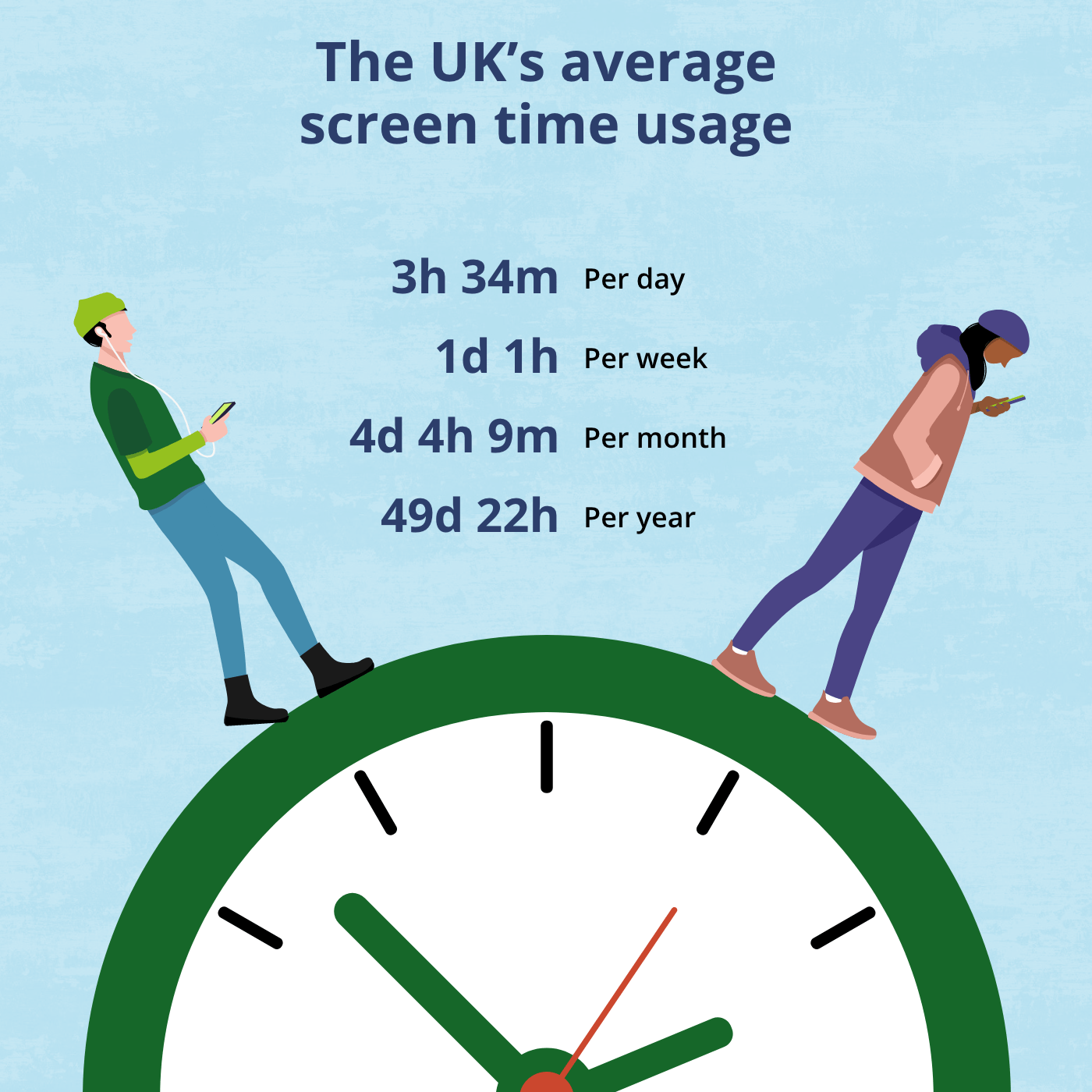
How often do UK couples have sex?
The ideal frequency of sexual activity can vary depending on several factors, including age, overall health, relationship status and personal preferences. However, 39% of Brits in relationships have sex every 2 weeks or less. 10% of Brits have sex less than once every 6 months.
Our phones play an essential role in our everyday lives, with 1 in 8 people surveyed stating they would prefer to go without sex than give up their phone.
According to Dr Sarah Bishop, Clinical Psychologist:
“Ultimately, the frequency of sexual activity right for you and your partner depends on your mutual desires and needs. It’s important to communicate openly and honestly with your partner about your sexual needs and preferences and find a frequency that works for both of you.”
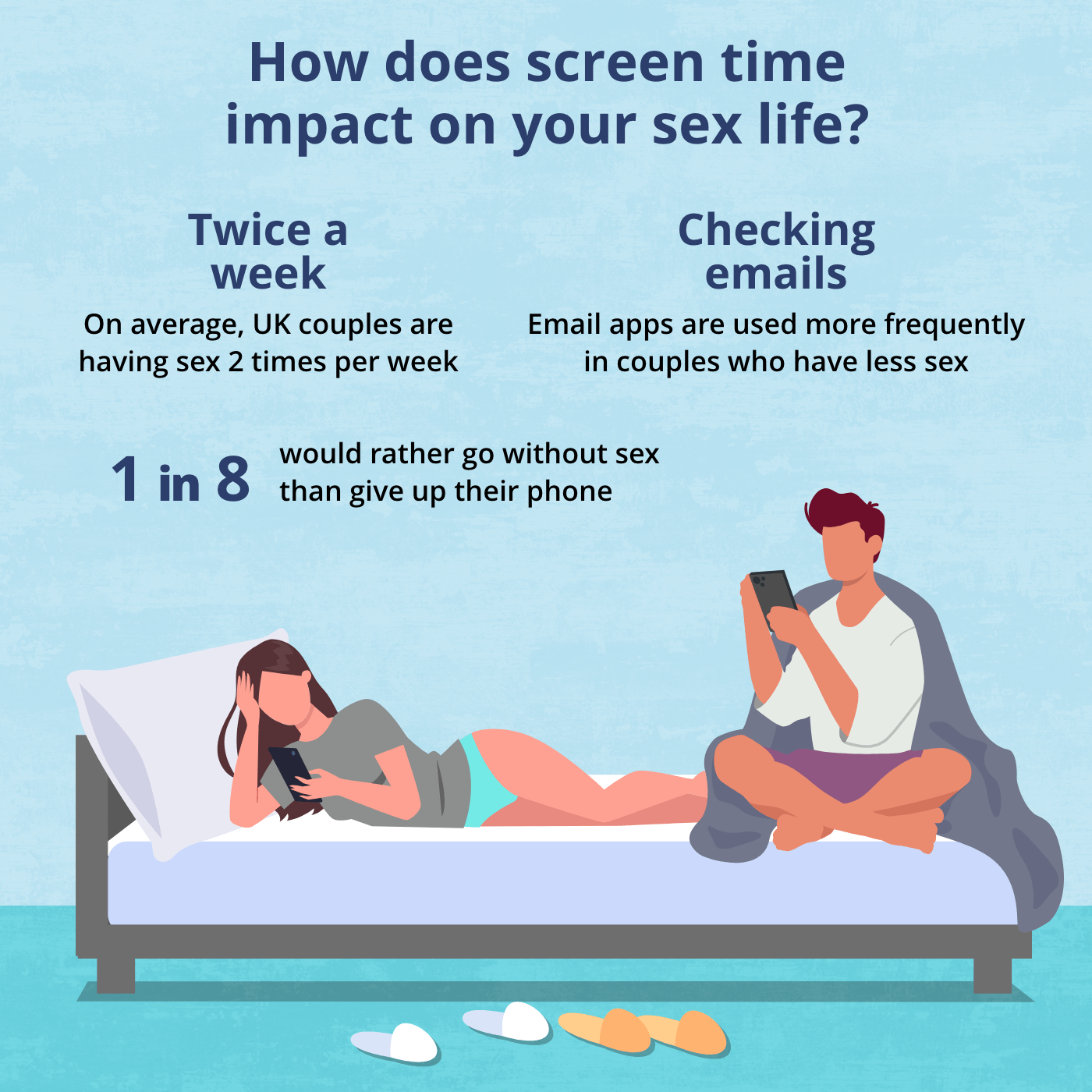
Choosing screen time over communication
A recently coined phrase, ‘phubbing’, combines ‘phone’ and ‘snubbing’ and refers to paying more attention to your phone than your partner. Phubbing can involve scrolling through social media, checking notifications or texting someone else during a conversation or social event.
Our study found 1 in 3 Brits feel ignored by their partner when they are using their phone. A further 1 in 5 admit to ignoring their partner when using their phone themselves.
38% of Brits who have sex less than once every 6 months also often feel phubbed by their partner. The graph below shows a direct correlation between those who feel ignored by their partner and how often they have sex.
According to Dr Sarah Bishop, Clinical Psychologist:
“If you are guilty of phubbing your partner, it is important to practise being present in your interactions. Try leaving your phone elsewhere or switching it off during conversations.
“Practise the skill of ‘active listening’; this is where we demonstrate that we have heard what has been said through our words and behaviours. For example, we may paraphrase what they said and show empathy.
“Try this whilst giving eye contact and adopting an open posture. This can help you to better understand your partner’s world and helps them to feel understood and cared for.”
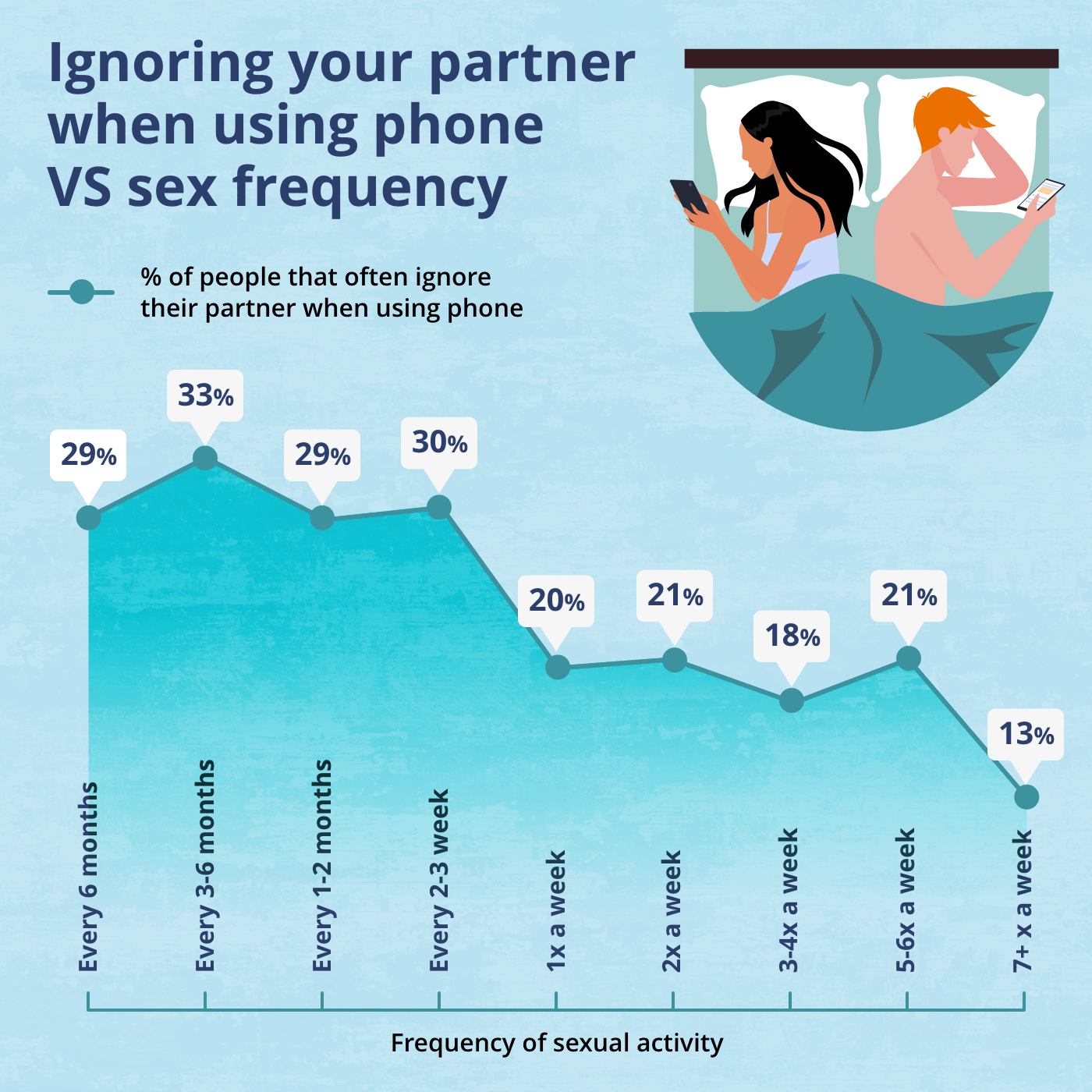
How does social media impact our relationships?
With the rise of social media in the home and bedroom, it’s more important than ever to be mindful of phone and social media usage. 45% of Brits say social media has negatively impacted their relationship in some way, with 30% of Gen Z feeling less confident after using social media.
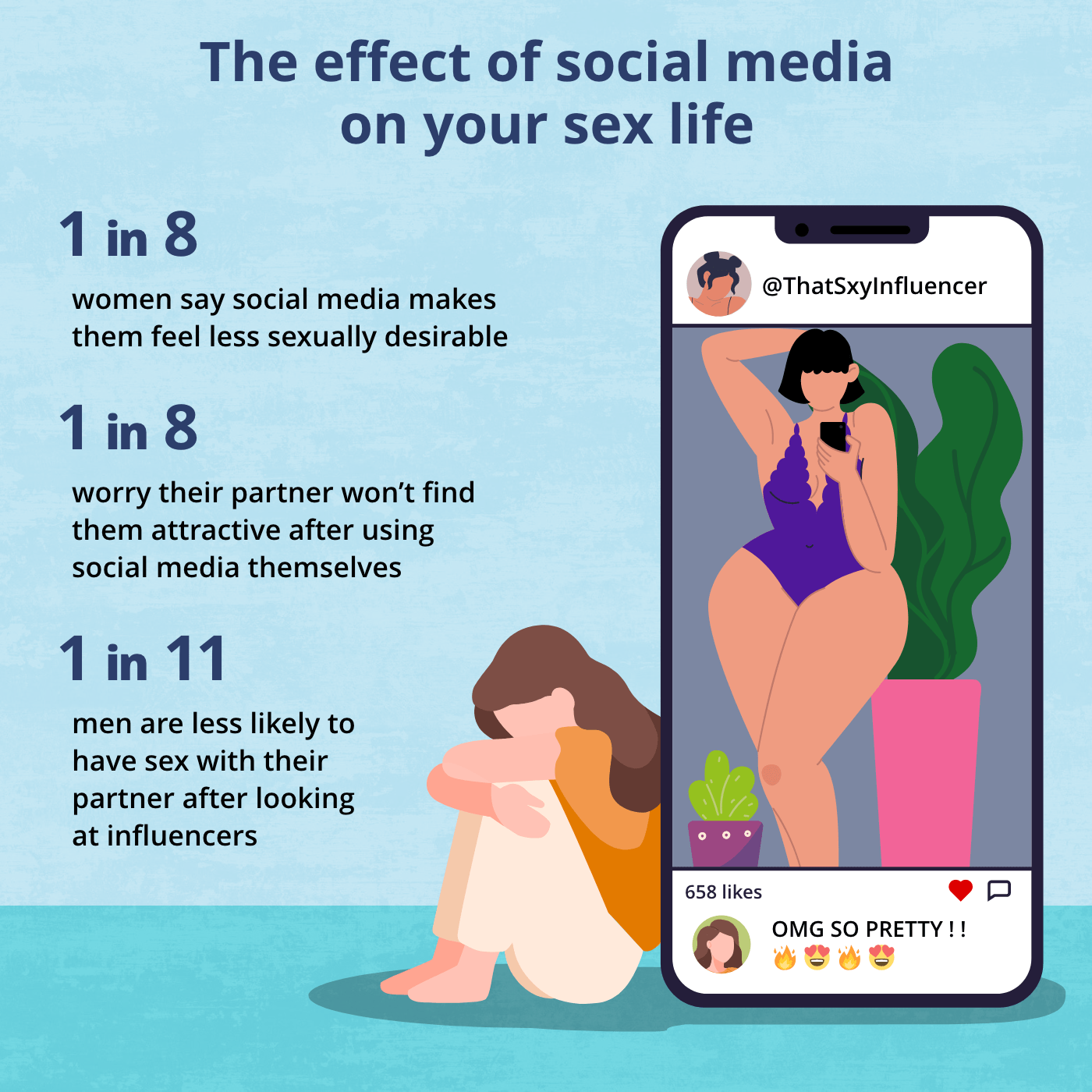
1 in 8 women say social media makes them feel less sexually desirable. After using social media,1 in 8 also worry their partner won’t find them attractive. A further 1 in 11 men are less likely to have sex with their partner after looking at influencers. Communicating with your partner about how their behaviour might make you feel is essential.
1 in 12 Brits has admitted to posting on social media during or immediately after sex. A further 42% admit they look at their phone before their partner in the morning, while 23% of Gen Z have answered a text during sex.
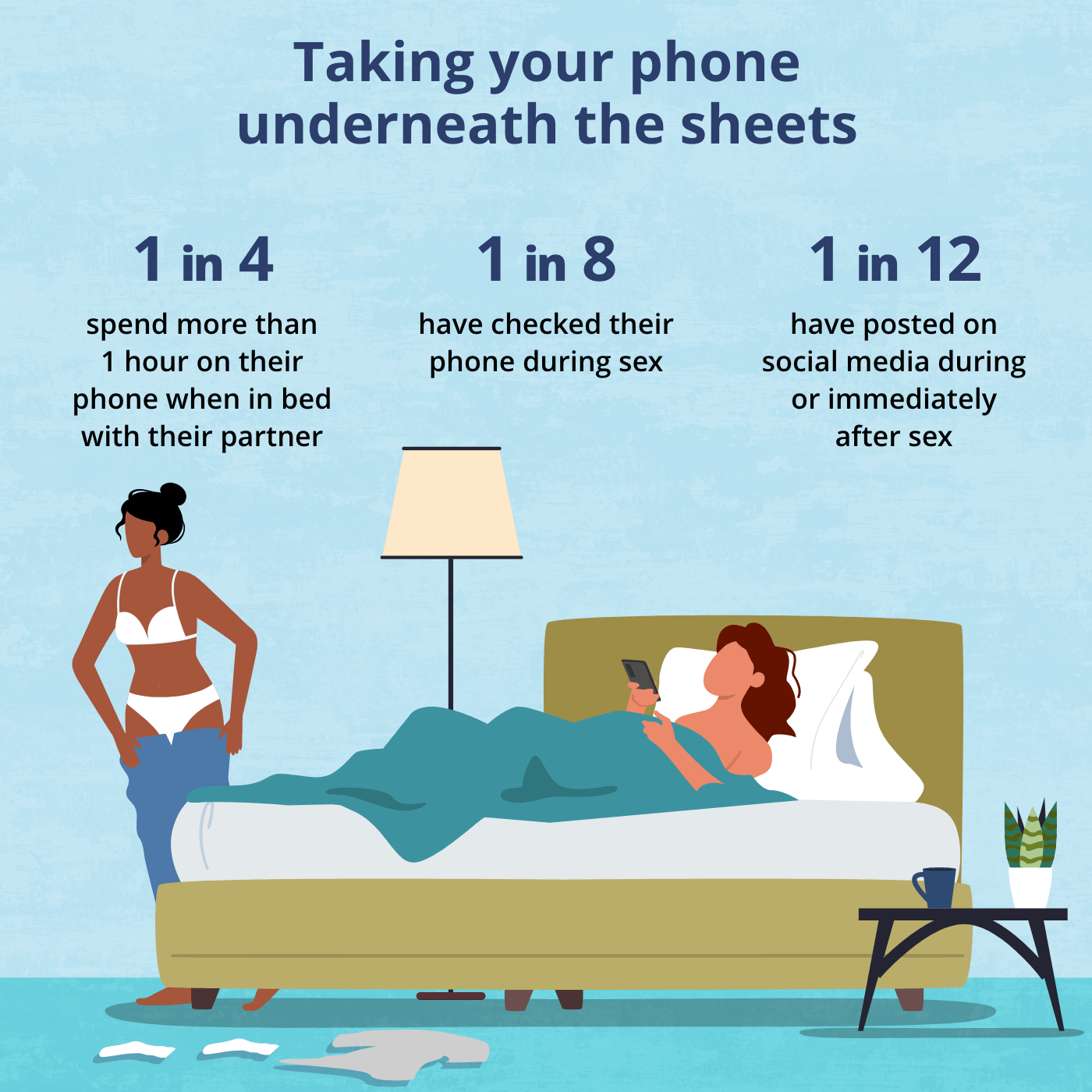
Dr Sarah Bishop, Clinical Psychologist, advises:
“If you feel like social media is negatively impacting your relationship, try to express your feelings calmly and respectfully, letting them know if their actions hurt you and that you value their attention and presence during sex.”
Why are Brits choosing technology over sex?
Why do Brits choose technology over sex? 1 in 4 respondents put it down to being too tired, while 1 in 7 say they do not feel confident with their bodies and use technology as a distraction.
Interestingly, 1 in 11 admit to enjoying streaming TV shows and movies more than having sex with their partner, making it one of the top 5 reasons Brits choose tech over sex.
Dr Sarah Bishop says:
“Partners will often demonstrate their anxiety about sex by avoiding it altogether. They may feel uncomfortable expressing their sexual needs or taking the lead.
“There may be physical symptoms such as difficulty relaxing, maintaining an erection, or reaching orgasm, or body image concerns. These difficulties can be overcome with practice and patience. Communication, education, and patience are key; support is available through counselling, medication, or sex therapy. Lifestyle changes such as reducing stress and healthier diet and exercise habits can also help.”
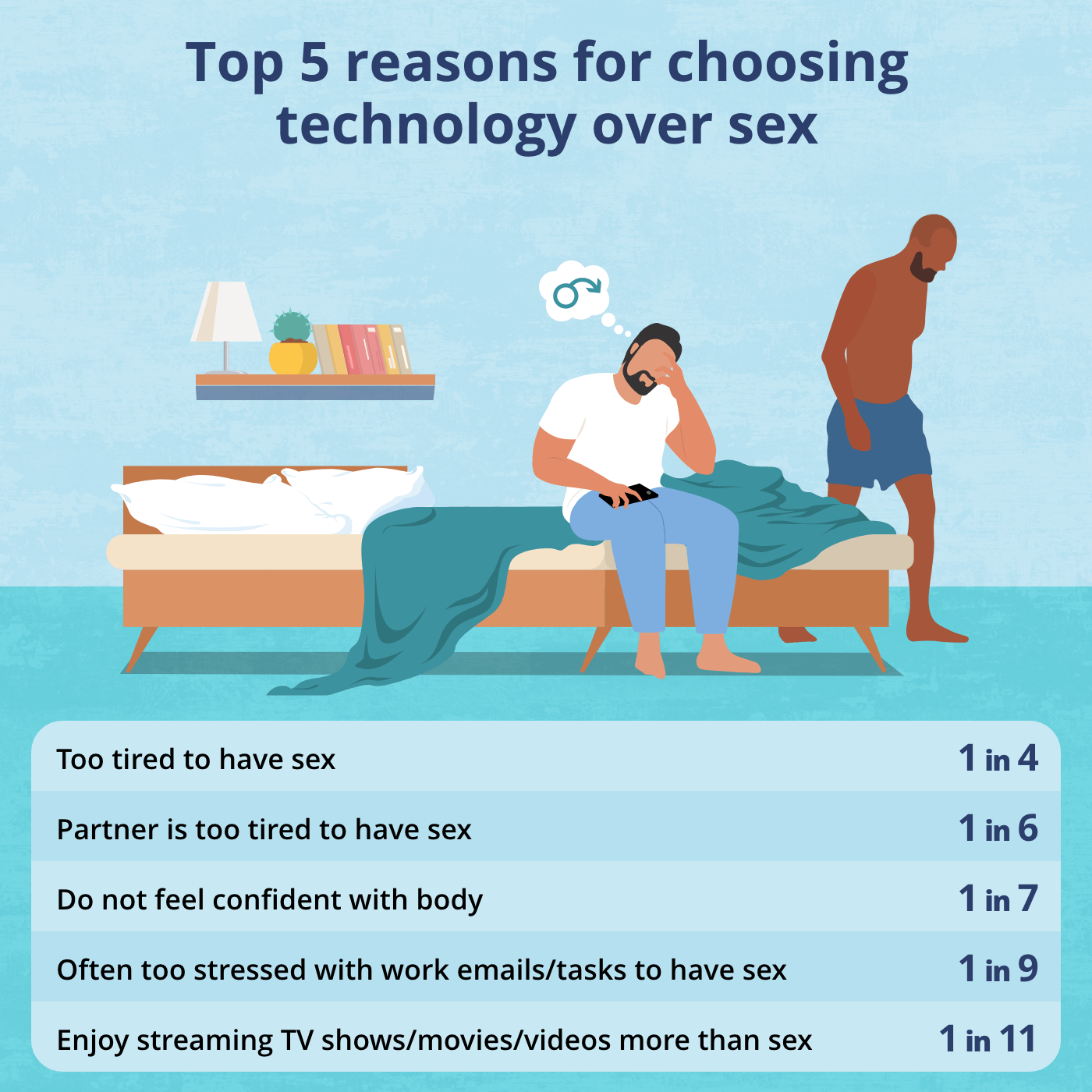
Technology and sexual performance anxiety
Alongside the above reasons for choosing technology over sex, 7% of men surveyed said that they experience sexual performance anxiety or erectile dysfunction, which also puts them off.
According to a previous survey, almost a third (32%) admitted having experienced these issues but never spoken about them. Of the men surveyed, 60% have experienced sexual performance anxiety at some point, with 31% never discussing it with anyone.
LloydsPharmacy Online Doctor GP, Dr Neel Patel, commented:
“Erectile dysfunction can have many mental and physical causes, so it’s best to get checked out by your GP to establish the underlying cause.”
“If your problems stem from sexual performance anxiety, there are several ways you can overcome it. Exercise can improve confidence. Talking to your partner to find solutions can relieve pressure, or trying something new in the bedroom that’s less focused on penetrative sex.”
“Some men also feel less sexual performance anxiety with the option of erectile dysfunction medication ready in their bedside draw, just in case.”
How your favourite TV shows can affect your relationship
Streaming TV shows have become increasingly popular in recent years; there are several ways they could potentially influence sexual behaviour and attitudes. 1 in 5 Brits say watching sex scenes is more likely to lead to intimacy with their partner, while 1 in 8 feel awkward watching sex scenes with their partner.
The portrayal of onscreen sexual behaviour can also create unrealistic expectations for viewers and lead to some feeling pressure to emulate on screen behaviours in their sexual relationships. This may not always be healthy or realistic. 1 in 9 Brits feels pressure on their performance after watching sex scenes.
While some couples may use TV shows to spice up their sex lives or explore new sexual fantasies, others may use them to avoid intimacy. 1 in 9 Brits would rather stream their favourite show than have sex.
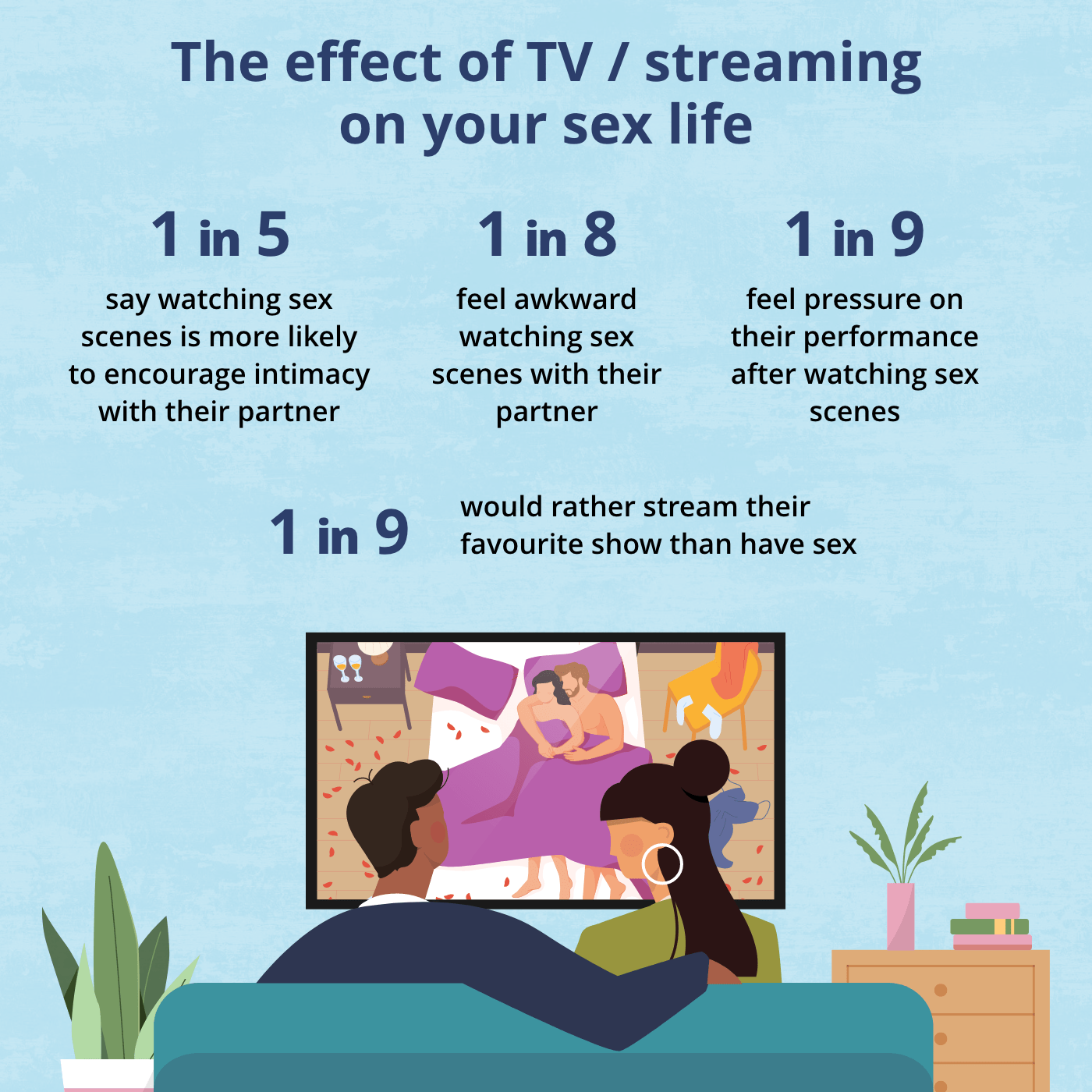
Is work taking over play?
Our study also revealed a connection between sex and work lives, with 1 in 10 choosing digital tasks over sex because they feel too stressed.
Maintaining a good work-life balance is essential for a healthy lifestyle and balancing your professional and sex lives. Our survey shows men are more likely to send work emails during or after sex, a turnoff for 14% of people.
Millennials are most likely to blur boundaries between work and personal relationships, with 11% admitting to this compared to just 6% of those aged between 35 and 44.
Dr Sarah Bishop reveals that:
“Spending excessive time checking work emails, feeling irritable and anxious when you can’t do this and neglecting personal relationships can be a sign of work addiction or burnout.
“You will need to be sensitive in your approach to this with your partner. The aim should be to approach the matter in a supportive and non-confrontational way. Express your care and concern for them. Stick to using “I” statements instead of “you”.
“Listen to their perspective and offer support. Consider what help may be available from work or other professional health services. Remember that change takes time and effort. It is unlikely to happen after one conversation. Be patient with each other; it can take a while to find the right balance and to stick with it.”
What are the UK’s biggest tech turnoffs?
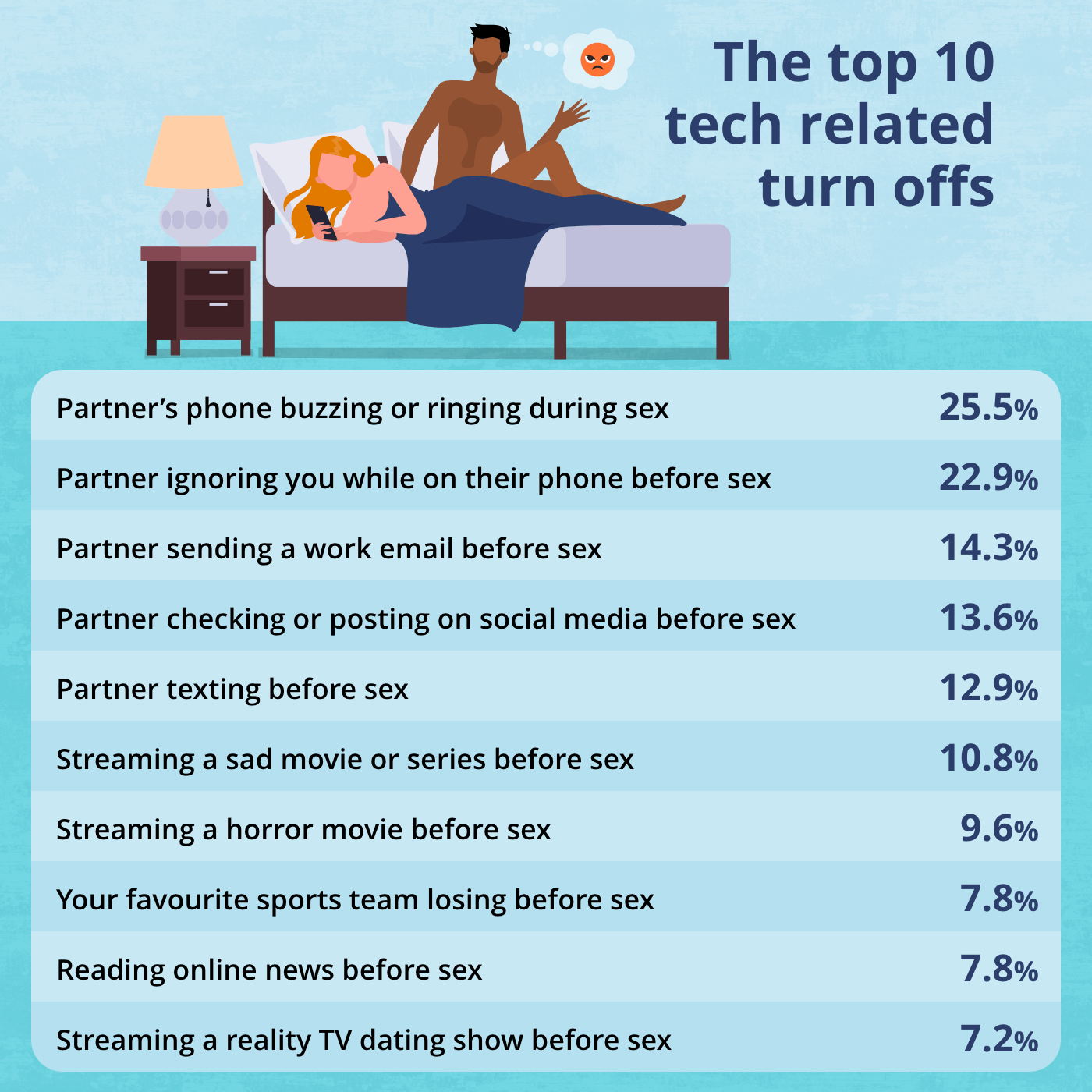
According to our survey, 58% of Brits have chosen technology over sex on multiple occasions.
1 in 4 say their partner’s phone buzzing or ringing during sex is their biggest turnoff. While technology can be a helpful tool for many things, using it during an intimate moment can create a sense of detachment and disconnection.
Could your sexual health benefit from a digital detox?
Our study found that 22% of Brits would like to go on a digital detox to improve their relationship with their partner, with 1 in 3 admitting they only have sex once every 2 months. Gen Z favours digital detox most, with 28% admitting they’d like to take one.
Google Trends data shows a 170% increase in global searches for ‘social media detox’ in the last 12 months. We spoke with Hector Hughes, Co-Founder at off-grid cabin escape, Unplugged, to reveal the benefits of digital detox for our sex lives, overall health and wellbeing.
According to Hector, spending at least 3 days without technology has been proven to help people feel calm and relaxed and improve cognitive function. It takes a day for the brain to settle, get used to being without devices and shake off civilisation.
Increased creativity and sexual health
"We often turn to technology any time we feel bored, but a bit of boredom is actually good for us. Removing yourself from the overstimulation of technology gives your brain space to think creatively. Being offline and in nature is proven to improve your memory, focus, attention and cognitive function. It’s also been linked to lower cortisol levels and enhanced happiness."
Better sleep quality to improve sexual health
"Another significant benefit of technology breaks is their positive impact on your sleep. Blue light emitted from your phone reduces the release of melatonin. This hormone makes you sleepy, making it harder to fall asleep and enter deep sleep after screen time.
Using your phone at night between 10pm and 4am can also suppress dopamine levels, impacting your motivation to do things you enjoy. I recommend leaving your phones away from the bedroom to provide a haven in the home where you can connect whilst you’re unwinding from the day."
Enhanced emotional connections with your partner
“Just the presence of a phone during a conversation lowers the quality of connection and reduces our levels of empathy. Removing your phones on date night or having phone-free zones in the house (such as the bedroom) can let you properly connect without accidentally ‘phubbing’ your partner. Most of our best memories and conversations are made when we’re technology-free.”
Methodology
Censuswide conducted a survey on behalf of LloydsPharmacy Online Doctor and surveyed 2,003 British participants over the age of 18 who are in relationships.





